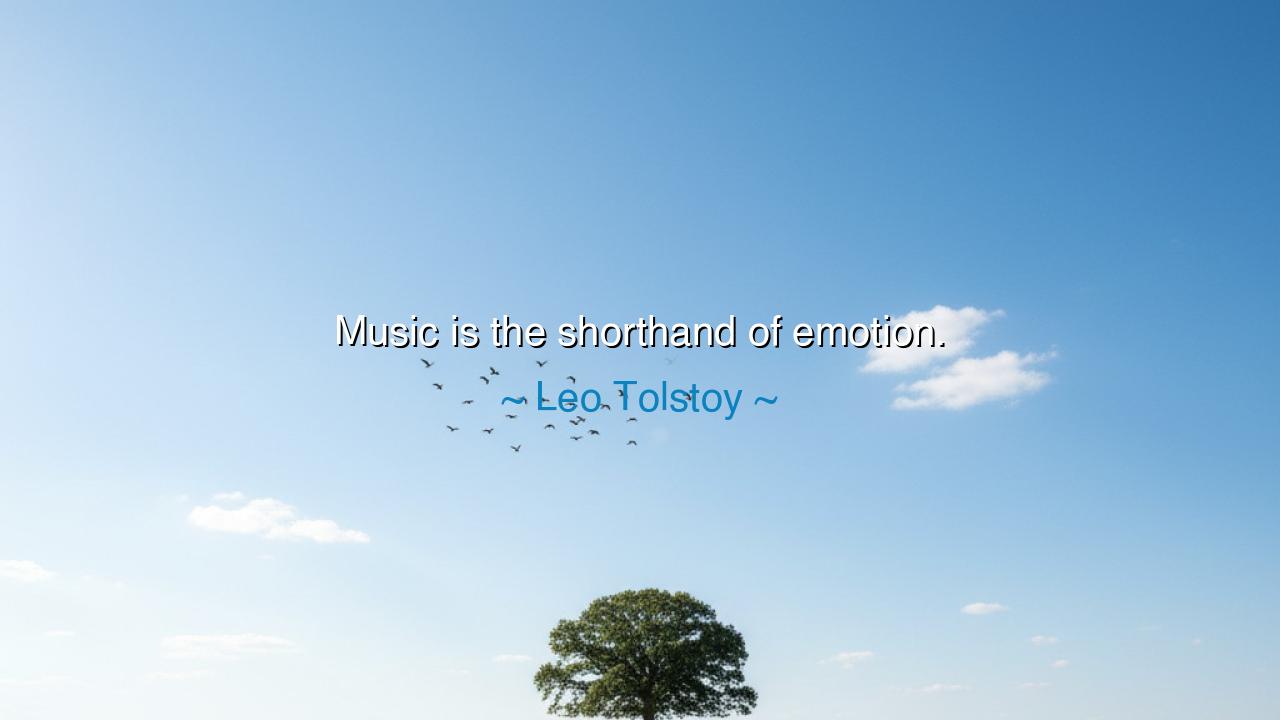
Music is the shorthand of emotion.






Leo Tolstoy, the great Russian sage whose pen carved the hearts of men upon the page, once declared: “Music is the shorthand of emotion.” In these words, he revealed a truth that transcends time and nation—that where words falter, music speaks swiftly, directly, and with piercing clarity. Just as shorthand condenses the written word into swift symbols, so too does music condense the vast and inexpressible sea of human feeling into tones, harmonies, and rhythms.
To call music the shorthand of emotion is to honor its mysterious ability to compress the immeasurable into the immediate. A symphony may say in minutes what novels cannot capture in hundreds of pages. A single chord may strike the soul more deeply than hours of conversation. In this way, music is not merely a companion to emotion—it is its direct translation, a language without grammar, yet universally understood. Tolstoy, who spent his life wrestling with the great storms of the human heart, recognized in music the most faithful messenger of what words could not contain.
History bears witness to this truth. Consider the funeral of Abraham Lincoln, when tens of thousands stood in mourning silence, broken only by the solemn strains of hymns. No speech, no proclamation could have carried the weight of grief so quickly, so deeply. Yet the music spoke for all, compressing the sorrow of a nation into sound. In that moment, the shorthand of emotion did what even the most eloquent tongue could not achieve.
Tolstoy’s own Russia knew this power well. The songs of the peasants, simple and repetitive, carried centuries of toil, of suffering, of endurance. In their voices was not just melody but the entire weight of their existence—sorrow, joy, resilience—all condensed into notes that could be sung and remembered. It was not necessary to explain their plight; their songs were explanation enough. Such is the efficiency, the swiftness, the shorthand of music.
And yet, this truth is not confined to sorrow. Love, too, is most swiftly spoken in song. Think of a serenade beneath a window, or the wordless sigh carried in a violin’s lament. Words stumble, falter, or grow clumsy in the face of great love, but a melody, simple and direct, conveys what the heart burns to say. In this way, music becomes the vessel of the most delicate and the most exalted emotions, carrying them straight into the heart of another.
The meaning of Tolstoy’s words, then, is both poetic and practical. They remind us that emotions are vast, complex, and often beyond the reach of speech. Yet music offers us a sacred tool—a way to communicate the depths of our hearts swiftly and universally. It is a language that needs no translation, for even the child and the stranger can understand. This is why music has always been central to worship, to mourning, to celebration, to resistance—because it conveys the inexpressible in a form all souls can receive.
For those who hear this wisdom, the lesson is clear: let music be your companion when words fall short. Do not be ashamed to turn to song when you cannot explain yourself, nor to listen deeply when another speaks through melody. Practical steps follow: seek music that stirs you, and let it teach you about your own hidden emotions; use it to comfort others when explanations fail; and above all, remember that to make music—whether by singing, playing, or simply humming—is to participate in the eternal shorthand of the soul.
Thus, Tolstoy’s words endure: “Music is the shorthand of emotion.” Carry this wisdom as a reminder that while words build bridges of thought, music builds bridges of the heart. Use it well, and you will find that no feeling need remain locked within, for the song will speak where the tongue cannot. And in this, you will know the greatest gift of music: that it unites us, swiftly and deeply, in the shared language of the soul.






AAdministratorAdministrator
Welcome, honored guests. Please leave a comment, we will respond soon